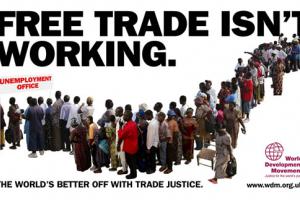Transatlantic Trade and Investment Partnership: Ten Threats To Europeans
Le Monde Diplomatique
 TTIP does away with “barriers” that impede the intercontinental flow of goods. This will make it easier for companies to base their production facilities on “cost” grounds, especially social ones. Workers’ entitlement to be involved will still stop at the border. TTIP will therefore mean a weakening of workers’ rights, despite guarantees under the EU’s Charter of Fundamental Rights.
TTIP does away with “barriers” that impede the intercontinental flow of goods. This will make it easier for companies to base their production facilities on “cost” grounds, especially social ones. Workers’ entitlement to be involved will still stop at the border. TTIP will therefore mean a weakening of workers’ rights, despite guarantees under the EU’s Charter of Fundamental Rights.







Spread the word